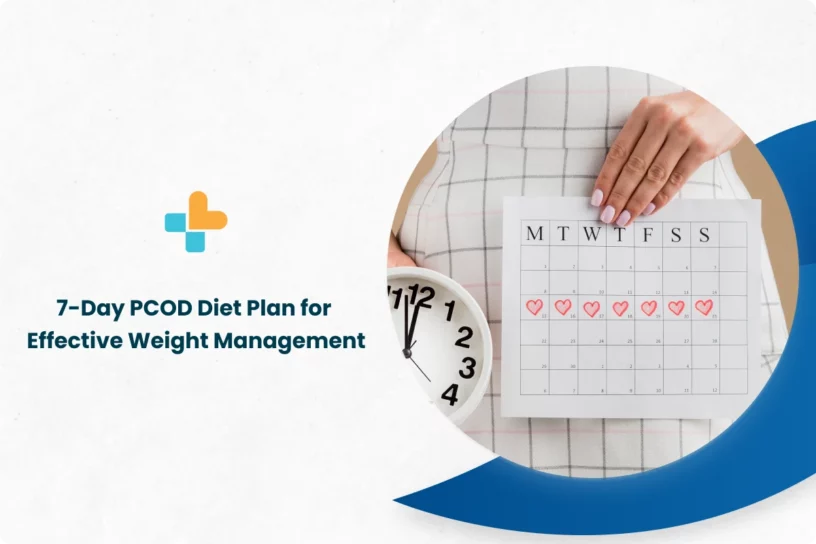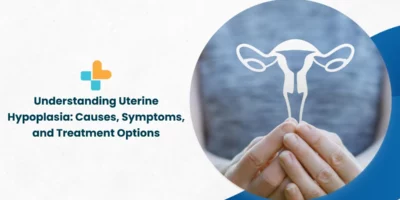Introduction
A very common condition affecting the ovaries of a woman is PCOD. Polycystic ovarian disease (PCOD) or Polycystic ovarian syndrome (PCOS) occurs when there is a hormonal imbalance that is caused when the ovaries produce abnormally high levels of androgens (male hormones). As a result of PCOD, there occurs an imbalance in the reproductive hormones. This hormonal imbalance can make a woman skip her periods or make it difficult for them to get pregnant.
Although the exact causes of PCOD are not known, certain risk factors that may be playing a part in causing PCOD include high levels of the male hormones androgen, low-grade inflammation, hereditary factors, and insulin resistance. The treatment for PCOD is decided by the doctor after thoroughly examining the patient. One of the treatment methods for PCOD includes lifestyle and dietary changes. A PCOD diet can help in losing weight and managing the condition effectively.
Let’s learn more about the PCOD diet
The impact of diet on PCOD
Most people who have PCOD have high insulin levels in their bodies. Insulin hormone is essential to convert glucose (sugar) into energy. Insulin resistance, a risk factor for PCOD, may occur when the body fails to utilize insulin properly. As a result, the body has to work more to make more insulin to keep the blood glucose levels in the body normal. In turn, high insulin levels lead to high production of androgens (testosterone) by the ovaries.
In addition, obesity, as indicated by a high body mass index, can also lead to insulin resistance, making weight loss more difficult for individuals with PCOD.
Diet plays a crucial role in managing PCOD, as it has weight management and insulin regulation. Following a diet that ensures nutritional adequacy, supports a healthy weight and regulates insulin levels can improve the overall health of individuals with PCOD.
Foods to consume for PCOD
Since there is no cure for PCOD, research suggests that a healthy lifestyle and dietary choices can help in managing PCOD effectively. You can get a customized diet plan from a doctor or dietician to manage your PCOD. In general, the following three diets can help patients with PCOD in the symptomatic management of their condition. This includes,
- A diet with a low glycemic index: A low glycemic index diet focuses on consuming slowly digested foods that do not cause sudden spikes in insulin levels. These foods include whole grains, legumes, nuts, seeds, fruits, starchy vegetables, and other unprocessed, low-carbohydrate options.
- A diet with anti-inflammatory foods: Certain foods that have anti-inflammatory properties, like berries, green leafy vegetables, fatty fish, and extra virgin olive oil, can help to alleviate symptoms related to inflammation, like fatigue.
- A DASH diet: Dietary Approaches to Stop Hypertension (DASH) diet, which is often prescribed to lower the risk of or mitigate heart disease, may also be beneficial for managing symptoms of PCOS. It includes a variety of foods such as fruits, vegetables, whole grains, poultry, fish, and low-fat dairy. The DASH diet limits the intake of high saturated fat and sugar foods.
You can also include the following food in a PCOD diet chart for weight loss,
- Foods high in fiber
- Dark green leafy vegetables
- Broccoli and cauliflower
- Beans, lentils, and legumes
- Fatty fishes like salmon, mackerel, and tuna
- Turmeric
- Cinnamon
- Fruits that are red in color, like red grapes, cherries, blackberries, or blueberries
- Olive oil
- Avocados
- Chicken
- Tofu
- Pumpkin
- Sweet Potatoes
- Walnuts, almonds
Foods to avoid in PCOD
A typical diet for PCOS should avoid foods that are commonly considered unhealthy. This includes the following foods,
- Foods containing refined carbohydrates like cakes, muffins, sugar-based desserts, and bread
- Fried foods
- Red meat and processed meat
- Foods that have high amounts of sugar
7 days Diet Chart for PCOD
You can follow this PCOD diet chart for weight loss.
| Day | Breakfast | Mid- meal | Lunch | Evening snack | Dinner |
| Day 1 | 2-3 idlis with half a cup of sambar and some chutney | 1 cup of green gram sprouts | 2-3 rotis along with fish curry, some salad (half cup), and cabbage sabzi (half cup) | Any one fruit (However, avoid consuming fruits high in energy like bananas) | 2 rotis and a cup of tomato sabzi |
| Day 2 | Brown bread 1- 2 slices, with a slice of low-fat cheese and egg whites of 2 boiled eggs | Any one fruit, (However, avoid consuming fruits high in energy like bananas) | A cup of Vegetable pulav made of rice, along with half a cup of curry made from soya chunks and half a cup of buttermilk | A cup of light tea and 1 or 2 wheat rusks | Bhindi or ladies’ finger sabzi half cup with 1-2 rotis |
| Day 3 | 2-3 rotis along with half a cup of green peas and potato curry | Half a cup of boiled black channa | Half a cup of palak sabzi, a cup of rice with a half cup of dal, and half a cup low fat curd | Any one fruit | A cup of broken wheat upma along with half a cup of green beans sabzi |
| Day 4 | 1-2 Methi paratha with some green chutney | Any one fruit | A cup of rice with some chicken curry and cucumber salad | A cup of light tea and half a cup of poha made from brown rice flakes | 2-3 wheat dosas, along with half a cup of bitter guard sabzi |
| Day 5 | A cup of oats upma with vegetables along with half a cup of low-fat milk | Yoghurt (Plain) with some raw or grilled vegetables | Half a cup of kidney beans curry, rice, and snake guard sabzi, along with 1-2 rotis | A cup of light tea and boiled Channa | 1-2 rotis with half a cup of miz vegetable curry |
| Day 6 | A cup of vegetable mixed poha and half a cup of low-fat milk | Any one fruit | 2-3 rotis along with half a cup of fish curry (100gms fish) and half a cup cluster bean sabzi | 1 cup of light tea with 1-2 digestive biscuits | 1-2 rotis with ridge guard sabzi |
| Day 7 | 1-2 uthappam with some green chutney | A cup of boiled Channa | Half a cup of soya chunk curry and ladies’ finger sabzi, along with a cup of rice and some low-fat curd | Any one fruit | A cup of broken wheat upma along with half a cup of green beans sabzi |
Tips and Exercises
Certain tips and exercises must be followed while on a PCOD diet to see effective results. Some of the tips and exercises that are to be followed while on a PCOD diet include the following,
- Apart from a healthy diet, consuming at least 2 liters of water per day is important to ensure optimum hydration.
- Limit your alcohol intake.
- Avoid eating foods containing sugars, fried foods, and other foods that may cause inflammation.
- Stress management is equally essential if you have PCOD. You can practice stress management techniques like yoga, meditation, or breathing techniques if you have PCOD.
- Exercising is equally important while on a PCOD diet for weight loss. According to experts, at least 150 minutes of exercise is ideal for each week. You can try exercises like,
- Brisk walking
- Jogging
- Cycling
- Swimming
- Tai chi
- Yoga
- Pilates
When to Consult Doctor
Most people with PCOD tend to ignore its symptoms and may not consider PCOD as a serious problem. However, it is important to show it to a doctor upon experiencing symptoms of PCOD like
- Weight gain, especially around the belly region
- Excessive hair growth
- Acne and oily skin
- Irregular periods
- Pelvic discomfort
- Trouble in getting pregnant
Conclusion
PCOD is a common condition, and although incurable, it can be effectively managed with lifestyle changes and a good diet. You can consult a doctor upon noticing any symptoms of PCOD. Depending on your condition, your doctor will give you the right treatment plan. Along with a healthy diet, exercising, hydration, and stress management are also important for the effective management of PCOD.
If you are concerned about PCOD, then you can connect with our experts at Ayu Health today. Our doctors provide the best treatment plans for PCOD, along with effective dietary charts and exercise routines for better management of PCOD. We also help our patients with any fertility concerns to ensure their utmost satisfaction.
FAQs
1. Is it possible to get pregnant with PCOD?
Yes, it is possible to get pregnant with PCOD. With the right treatment plan, including medications, healthy weight management through diet and exercise, effective stress management, and controlled blood sugar levels, it is possible to get pregnant. You can consult a doctor to learn more about PCOD and its treatment.
2. Is PCOD curable?
No, unfortunately, there is no cure for PCOD. However, a healthy lifestyle and diet can help in managing it better.
Our Hospital Locations
Gynaecology Surgery Hospitals in Chandigarh | Gynaecology Surgery Hospitals in Bangalore | Gynaecology Surgery Hospitals in Jaipur | Gynaecology Surgery Hospitals in NCR | Gynaecology Surgery Hospitals in Hyderabad
Our Doctors
Gynaecology Surgery Doctors in Chandigarh | Gynaecology Surgery Doctors in Bangalore | Gynaecology Surgery Doctors in Jaipur | Gynaecology Surgery Doctors in NCR | Gynaecology Surgery Doctors in Hyderabad
About the Author

Dr. S. Goel
Dr. S. Goel is a renowned Internal Medicine Specialist currently practicing at Ayu Health, Bangalore. He is a Specialist in Internal Medicine, Diabetes HTN, Paediatric Care, and Family Medicine.




